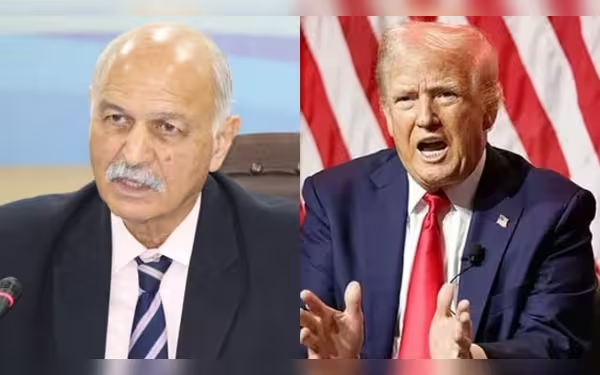Thursday, November 21, 2024 11:27 AM
Mushahid Hussain Applauds Trump's Stance on Deep State
- Mushahid praises Trump's resolve against the Deep State.
- He emphasizes Pakistan's strategic space and foreign policy reevaluation.
- Mushahid highlights the importance of regional cooperation.
 Image Credits: thenews
Image Credits: thenewsMushahid Hussain commends Trump's efforts to address the Deep State, urging a reevaluation of Pakistan's foreign policy for regional stability.
In recent times, the political landscape of the United States has seen significant shifts, particularly with the election of Donald Trump as President. His victory has sparked various reactions across the globe, including in Pakistan, where former Senator Mushahid Hussain Sayed has expressed his approval. He believes that Trump’s leadership could be beneficial for world peace, especially in the context of the ongoing tensions between nations.
During a keynote address at the ‘Margalla Dialogue’, Mushahid Hussain articulated his views on the implications of Trump’s presidency. He emphasized the importance of addressing the so-called ‘Deep State’ in the U.S., a term often used to describe a network of influential members within the government and military that operate independently of elected officials. According to Mushahid, Trump’s determination to control this entity is a positive step, as it could lead to a more stable international environment.
Mushahid also outlined what he referred to as the ‘red lines’ in Pakistan’s national security and foreign policy. These include the protection of Pakistan’s nuclear and missile programs, the ongoing issues surrounding Occupied Kashmir and Palestine, the significance of the China-Pakistan Economic Corridor (CPEC), and the rejection of Indian dominance in the region. He stressed that Pakistan must not become involved in any efforts to destabilize Iran, highlighting the need for a balanced and principled foreign policy.
In his address, Mushahid pointed out the changing dynamics of global power. He noted the retrenchment of Western influence and the rise of China, alongside the resurgence of the Global South. He suggested that countries like Pakistan, Turkiye, Iran, Saudi Arabia, and Indonesia are poised to play crucial roles in regional politics over the next decade. This shift could redefine alliances and power structures, offering new opportunities for collaboration among these nations.
Furthermore, Mushahid praised Trump as a unique figure in American politics, being the first president since John F. Kennedy who is not closely tied to the American security establishment. He argued that this independence could allow Trump to pursue policies that are less influenced by traditional power brokers, which he believes attempted to undermine Trump’s election campaign.
In addition to his comments on U.S. politics, Mushahid called for a reevaluation of Pakistan’s foreign policy. He urged the government to avoid a one-sided approach towards India, particularly in seeking trade and dialogue. Instead, he advocated for fostering better relationships with neighboring countries like Afghanistan and Iran, while also addressing Chinese concerns regarding terrorism.
Concluding his address, Mushahid Hussain emphasized that Pakistan now possesses a unique ‘Strategic Space’ in the region. However, he cautioned that the greatest challenge lies in overcoming a mindset of defeatism and fear that has historically plagued the nation. He believes that fostering a more positive outlook is essential for Pakistan’s progress and stability.
In summary, Mushahid Hussain’s insights reflect a broader understanding of the geopolitical landscape and the potential for Pakistan to navigate its challenges effectively. As the world continues to evolve, it is crucial for nations to adapt their strategies and foster cooperation, ensuring a more peaceful and prosperous future for all.













